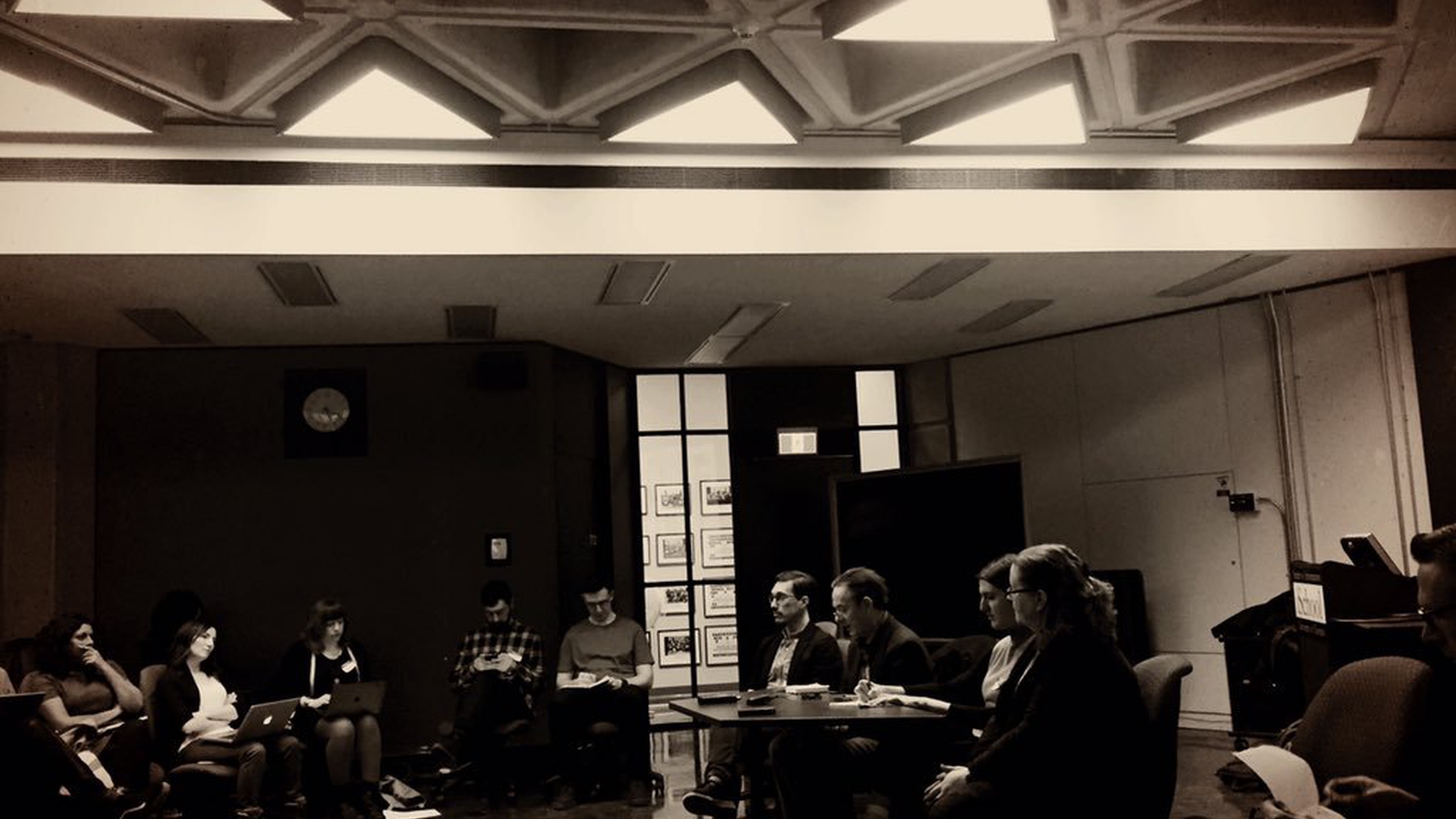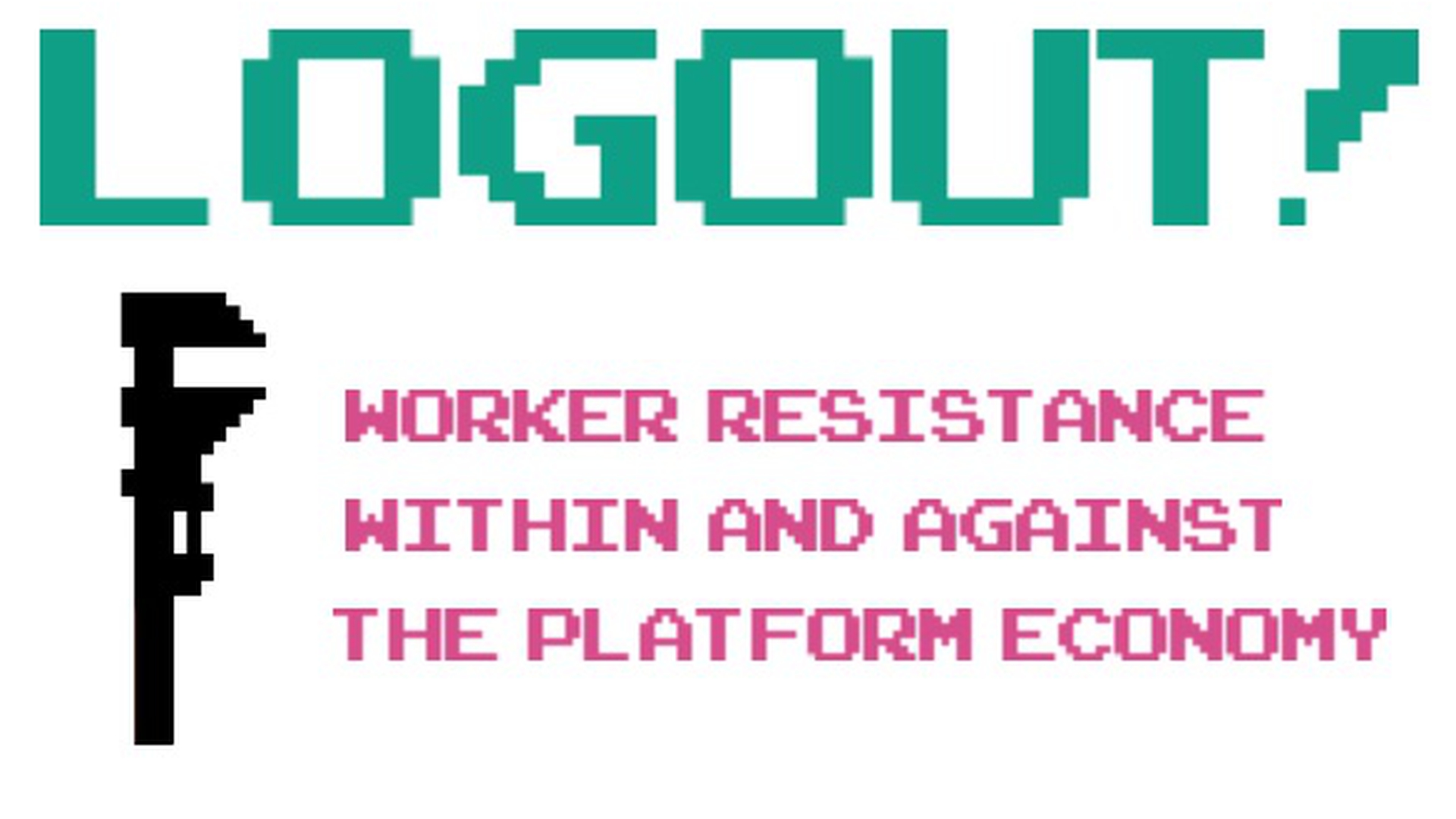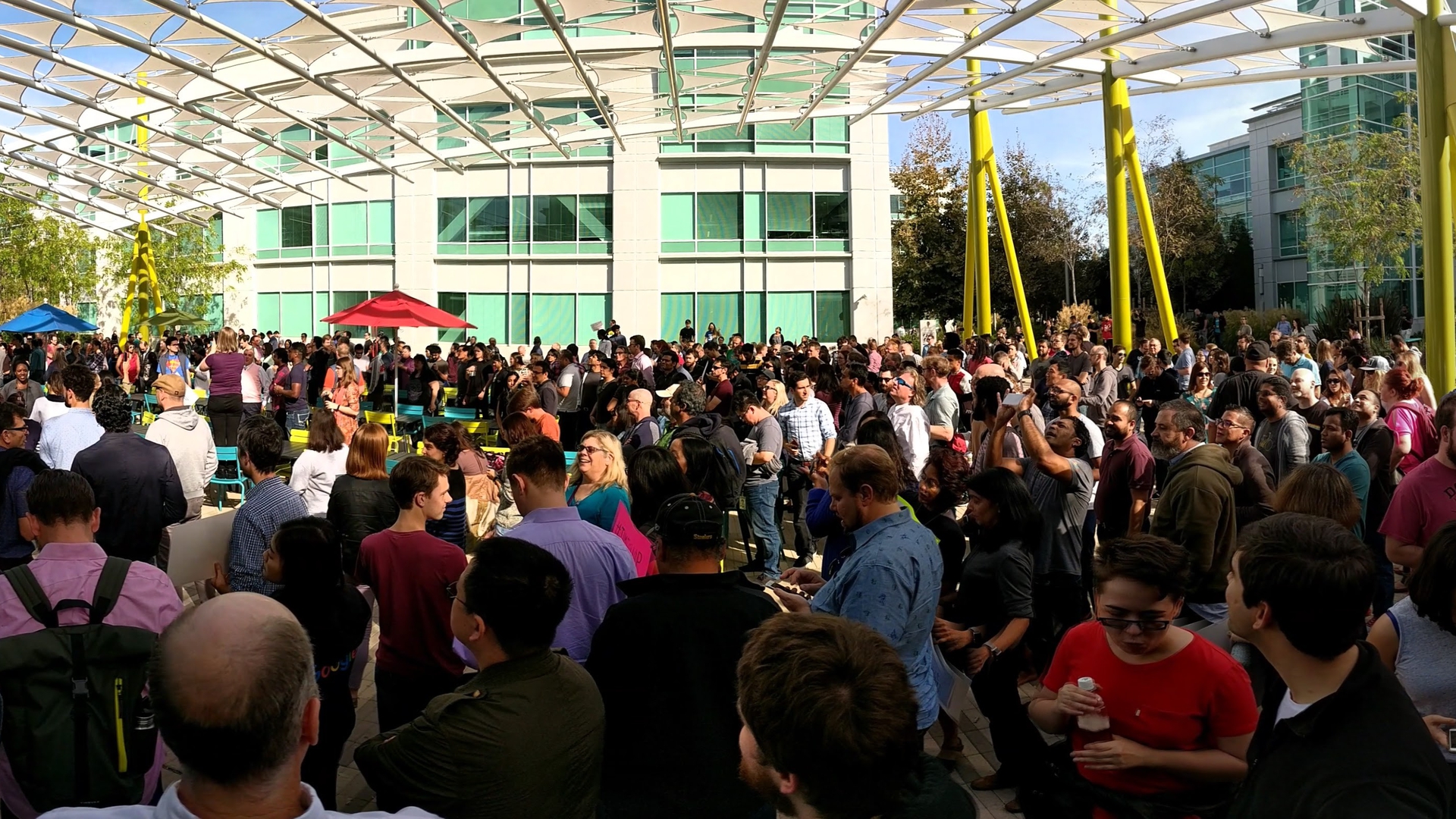Checking in on Log Out!
by
Alessandro Gandini,
Nick Dyer-Witheford,
Kristy Milland,
Lilly Irani,
Rianka Singh
June 8, 2019
Featured in Logout! (#8)
Reflections on Platform Labour

inquiry
Checking in on Log Out!
by
Alessandro Gandini,
Nick Dyer-Witheford,
Kristy Milland,
Lilly Irani,
Rianka Singh
/
June 8, 2019
in
Logout!
(#8)
Reflections on Platform Labour
To close out the Log Out! Conference, the organizers invited four contributors to participate in a roundtable. Each contributor was asked to pull threads from the diversity of presentations heard throughout the day and to help us think through what future action and resistance to the conditions of work under platform labour might look like.
The roundtable presented here is an edited version of a conversation between Nick Dyer-Witheford, Alessandro Gandini, Lilly Irani and Kristy Milland. This mix or respondents, diverse in their backgrounds as academics and workers, undertake the difficult project of summarizing a day’s worth of ideas in a few minutes.
Nick Dyer-Witheford
This has been not only an enjoyable, but an intellectually and politically significant day. I am going to summarize what I heard today and speculatively suggest some ways we might collectively develop and deepen the analysis which has emerged. To organize my thoughts, I use four terms: cycles of struggle, sectors of capital, strategies of resistance, and circulation of struggles.
I’ll begin with cycles of struggle. The day began with the proposition of a hypothesis, namely, that we are beginning to see the emergence of a new cycle of struggles, a wave of movements in which the cybernetic offensive digital capital has waged for the last 40 years against the proletariat is for the first time starting to meet truly significant worksite resistance. It is interesting to think about the relation of this moment to earlier waves and cycles of struggle. Perhaps this is the moment at which insurgent energies that in 2011 largely abandoned the workplace in favour of resistance in the squares and streets of the Occupy movements now return, in a transformed mode, to the abode of production. But if this is the beginning of a new moment of resistance, how might it advance?
That brings us to sectors of capital. In today’s discussions, under the heading of “Platform Capitalism”, we have heard analysis of a wide variety and sites and sectors of digital capital, with related but differing modus operandi. We heard about workplaces in which capital organizes labour for toils done almost entirely on virtual platforms, such as that of workers on Mechanical Turk or the work of Instagram influencers. We have heard about sites where capital organizes highly physical forms of labour mediated through digital managerial and coordinating platforms: we might think here of Deliveroo drivers or the nurses who now have to bid on platforms to work certain shifts. We have also heard about the places where capital organizes the sort of physical and intellectual labour which is in fact necessary for virtual platforms to function, such as the Amazon fulfillment. It seems to me that it is very necessary to both make distinctions between these different sites of platform capital and to connect them. It is important to distinguish them because there are indeed very real differences in how they operate and our analysis will lack credibility to participants in these various ese sites if we collapse all their labours under a single homogenous heading— “platform capitalism”. And yet at the same time it is clearly vital to draw connections because this is how we point to way to possibilities of political alliance.
Perhaps the very richest part of the conference has been hearing about a multiplicity of strategies of resistance. These range widely, and include formulating labour standards for platform workers; the development of labour movement platforms for organizing; stealth networks constructed outside managerial view to incite strike action; possibilities for platform cooperativism; and informal resistances, involving practices of “flexibility from below” and “gaming the system.” We need to think about the relations between these strategies, their possible complementarity, but also, if we are to be honest, some of their real tensions, perhaps even contradictions, and also about the possible sequences of their unfolding–not just what is to be done, but what is to be done first and in what context.
Finally, the circulation of struggles. I suggest that we have today all been participating in a moment of the circulation of struggles. This event, the work of the organizers, has been a remarkable exercise in bringing together, and communicating with, a wide variety of activists and intellectual strands from Canada, from all shores of North America, from Italy, from the United Kingdom and China. We will want to continue that process of the circulation of struggles; those of us who are academics have an unusual, exceptional opportunities, through teaching, publishing, conferencing, to play an important role in that process. I certainly intend to relay the content and the complexity of our discussions today to as many meetings and conferences as I have the opportunity to attend and I imagine that all of us will do the same. The struggles that have been discussed, as Sarah Sharma suggested at the beginning of the conference, involve nothing less than changing the pace, pattern, and scale of life as it is lived today under digital capital. Let us circulate, nurture, intensify and deepen this cycle of struggle.
Alessandro Gandini
My first encounter with platform labour was in 2010, when as a PhD student I was tasked with choosing a digital platform to study as an empirical case. The platform I chose was called Elance. Since then, Elance undertook a merger with its main competitor, oDesk. It is interesting to see that the product of this merger has turned out to be one of the most important freelancing platforms today in terms of number of subscribers —- UpWork. I think the LogOut! conference presentations are testimony to the amount of research that has been and is being produced about this topic over recent years, and the critical mass that is gathering around the study of the ‘gig economy’.
As a community of researchers working on digital labour, however, I believe we have so far talked much less than we should about the role that consumers, especially on platforms like Uber and Deliveroo, play within this picture. One of the key elements in the success of these platforms is that purchasing food through delivery apps, or cabs, is their branding, which portrays an allure of ‘coolness’, and that has a value for consumers of these platforms. We need to talk about this ‘coolness’ more. There is a convenience in economic terms but also in consumption terms to use these platforms, that are cheap for consumers, and cool. The platform cooperatives proposal, which I’m very sympathetic to, will have to at some point come to terms with the idea that one of the main things that existing platforms have been successful at, is to offer a cool and cheap service that is difficult to challenge.
From the side of work, it seems that platforms are designed to make it very difficult for workers to socialise with each other. It is interesting, however, to see research that picks up where there are ‘gaps in the system’ of work individualization, like Callum Cant’s work on Deliveroo, which shows that when you let workers stand in the same space with other workers, they will end up talking and this is going to be a problem for the platform. These are designed to suppress or minimize, at the very least, contact among workers. This is something that the forms of resistance, that we have heard about today, will have to pick up and take to the next level to exploit the many ‘gaps in the system’ that we have been able to see.
From a research perspective, much of the research we have heard today is ethnographic, but this is not sufficient. We need more research that unpacks the internal workings of these platforms in their interplay of human and digital nature. I think we need to understand the social and cultural construction of these platforms and learn more about how the algorithms and codes that run them are designed and constructed. The Black Box these platforms represent is much more complex than just its code. As researchers we are called to question how these algorithms are constructed from the inside, and how opinions translate into code that is imposed upon workers.
I’ve come to study digital labour as a PhD student; back then, the debate was about how social media were putting users ‘at work’ by exploiting their leisure. With the many examples we have seen today, a clear point can be made: what we’ve come to is a context that can be summarised as “labour, not leisure”, and that needs to be treated as such. This involves a qualitative shift in terms of understanding what is at stake when a digital object like a platform comes to intermediate capital-labour relationship. Platforms are not just marketing intermediaries, or ‘simple’ media, but pseudo-employers. These are much more complicated entities that must be questioned and understood by moving beyond the boundaries of existing theoretical approaches across media and labour scholarship.
Lilly Irani
Log Out! asks us to consider disconnection, resistance, and refusal as part of the politics of value accumulation in the digital industries. We are here as academics, as tech workers, whether programmers or Mechanical Turk workers, and as people who generate value for the industry in very different ways. How do we identify with one another’s struggles? How do we generate solidarities?
My own biography has moved through these different positions. As a tech worker, I was asked to design systems that required the labor of temporary and offshored data processing workers that made the magic of AI work. I was one kind of tech worker, but my productivity in the labor process depended on the exploitation and cheapness of other kinds of tech workers’ labors. Antagonisms with management were obscured by antagonisms between programmers and the data processing workers they required and disavowed. Sarah Sharma has also written beautifully about this – those workers, like taxi drivers, who act as media enabling the circulation of other kinds of workers, say managers, in the production of value. As a women studying computer science, I was also channeled into fields where naturalized communicative skills like “empathy” were both denigrated as less than “hardcore coding” but also valorized as core to design. I came into this having seen how my mother’s housework was much less valuable than my dad’s engineering work. That structure and ideology was being repeated in my workplace. My social subjectivity as a tech worker depended on the exploitation of fellow workers. But my own gendered history of home predisposed me to disidentify with that extractive tech sociality. That disidentification from tech work forms were key to how I came to build a system like Turkopticon – a project that brought me into conversation with Kristy Milland and other MTurk workers. Feminist affect theories offer resources for analyzing how our capacities to affect are structured by capital, race, gender, and other processes of difference, as well as the possibilities of redirecting the capacity to care and affect to resist or dismantle. The multitudes prefigured by Hardt and Negri exist in social forms structured by capitalist production. They require us to locate ourselves, analyze how our relations to others have been structured in capitalism, and to unlearn the dispositions that make us more comfortable and valuable connected rather than logged out. Becoming the multitude will take reorganizing ourselves and our connections.
Academic dispositions are worth questioning here. As an academic worker, this conference format is quite familiar. I also work at a public university that relies on less and less state funding. So they nudge us into digital value production. They want us to teach MOOCs and offer digital certificates to train local people who want to increase their wages in their work and entrepreneurship. Our employer surveils our key strokes. The long history of our research University has been one of participating in militarism that has sustained American economic production. As an Iranian American, my parents came here because of wars set into motion through the geopolitics of nation-states, world wars, and oil imperialisms. There are many directions to resist.
As an ethnographer I am leaving Log Out! with lessons and challenges to my own writing nad method. What am doing when I am publishing an article about labor? Who am I publishing it for?
Jamie Woodcock, Callum Cant, and the Tech Worker Coalition (TWC) offered us models of workers’ inquiries. In written form, Notes from Below publishes knowledge about labor from the perspectives of workers embedded in those processes. Workers’ inquiry in spoken form, as practiced by TWC, generates affectively charged conversations and worker sociality. These conversations between workers remake the speaker and hearer not as a designer, a programmer, or networker, but as a worker whose life is torqued by value extraction processes. Written or spoken, workers’ inquiries invite workers into producing new knowledge of about the nature of work.
We ought to question our academic conference forms here as well. There are many people who can’t be at an academic conference for financial reasons, for geographical reasons, for because this structure of communication is not accessible to them. How do we reconfigure our ways of convening to widen the circulation of struggle? Disability scholar Dr. Louise Hickman articulates access labor as those labors that create access to spaces of communication, whether classrooms, archives, or public institutions. She formulates access as the enabling of bodies through the investment of resources into bodies, relations, and environments. Access labor foregrounds how collective life is a product of labor – not natural to the multitude, and not just a question of translation, description, or retrofit. How might we learn from the forms of digital convening organic to many online workers while building away from the platforms that surveil us and extract value from our communication practices? Log Out! asks us to consider struggle amidst and against digital extraction. The work of organizing always requires the labor, the resources, and the imagination to produce access.
Kristy Milland
I am calling out academics, workers, and organizers alike. The Log Out! Conference was blessed by the presence of all three, a rarity at academic events. That is why I want to push everyone in attendance to work with workers. In the past, academics tend to want to do what is right for us, and the organizers, with great intentions, want to do what they already know. Yet workers provide insight into both the research and the organizing that these experts are engaging in. For example, half of the work posted on Amazon Mechanical Turk happens to be projects and surveys posted by academics. Yet rarely are we asked for our input on how to craft the work so it is most efficient or effective, nor are we provided with the outcome of a survey and asked if the results they got seem reasonable. With organizing, we have had individuals appear on our forums and promise us a union, but organizers who have asked us what we want to do and how we want to do it are infrequent. In the end, there is no one better equipped to give you feedback on your mTurk work, survey, or organizing ideas than the workers who are intended to participate in these projects. Workers can provide advice, analyze data, craft organizing campaigns, or even be your co-author on a paper. Our knowledge, experience, and voice are missing in both academia and traditional labour organizations, and this is not only a detriment to the workers, but to academics and organizers as well. A partnership is mutually beneficial.
I do not just want to call out the experts, of course. Workers also need to get more involved in bettering their situation. To begin, workers from all platforms need to get together to share resources and fight for each other’s demands, be it Uber drivers who want higher rates or Handy helpers who want health insurance. I would love to see more solidarity between workers and academics, especially those who are trying to make tools to help us work or other projects which can lead to better work conditions. I want to see partnerships between unions and freelancers who then together can work to change legislation, organize resistance events, or partner up to create new collaborative platforms. In the end, it is solidarity which will lead us out of the painful world of work that has been created for us. We may all come from disparate backgrounds and disparate work experiences, yet in the end we are all workers vying for a better life. To do that, we have to share. More collectivism, more interconnections, more conferences which include workers. From picketing to programming cooperative platforms, participating in surveys to providing advice, collaborations are the key to counteracting the negativity of neoliberal capitalism. Let’s all do this together. Everyone is a worker, and a more positive future of work depends on our collective efforts towards ending exploitation.
Featured in Logout! (#8)
Subscribe to Notes from Below
Subscribe now to Notes from Below, and get our print issues sent to your front door three times a year. For every subscriber, we’re also able to print a load of free copies to hand out in workplaces, neighbourhoods, prisons and picket lines. Can you subscribe now and support us in spreading Marxist ideas in the workplace?
Read next

Log Out! The Platform Economy and Worker Resistance
by
Alessandro Delfanti,
Sarah Sharma
/
June 8, 2019

